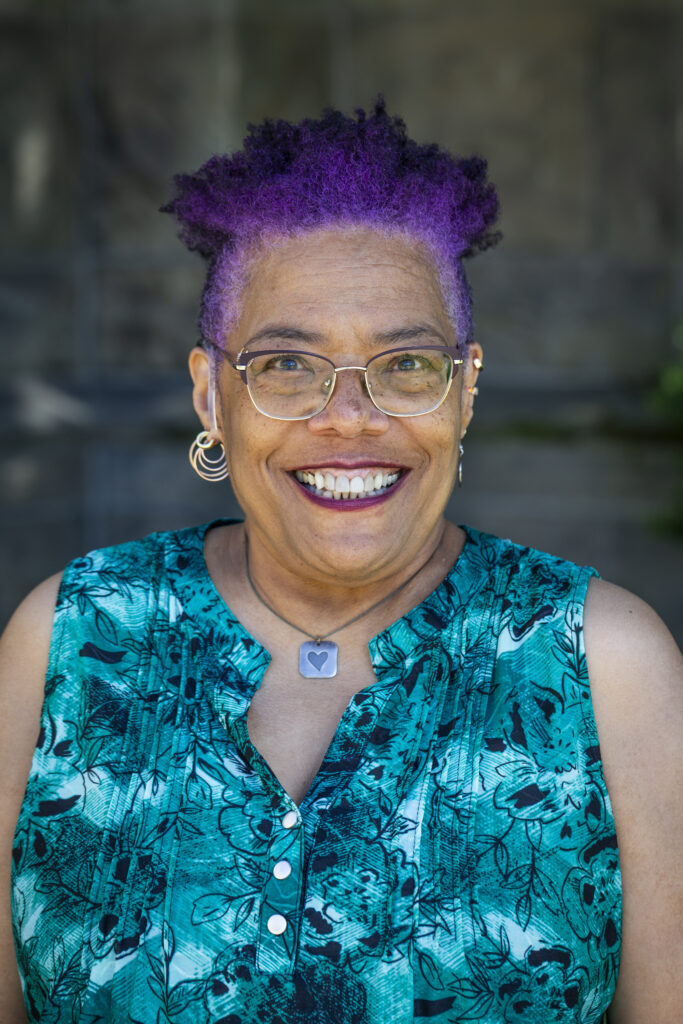Investing in Transformation: A Conversation on Giving to PSR with Grace Gilliam
In this Donor Spotlight, meet Grace Gilliam, a dedicated practitioner and scholar of Buddhist Psychology and Spiritual Care. Grace’s journey of spiritual exploration led her to a deep immersion in Buddhist teachings after studying Contemplative Psychology at Naropa University and earning a Master of Theological Studies (MTS) at PSR. In 2012, she joined the staff at PSR, where she currently serves as the Associate Director of Community Engaged Learning, shaping our academic landscape with her insights and commitment to holistic education. She’s now continuing her education at PSR, pursuing a Doctor of Ministry (DMin) degree. Her studies are focused on contributing the Buddhist teachings on skillful means to the formation of spiritually rooted leaders in seminary education.

Tell us about your current ministry or work in the world.
If I really would say my work in the world, like the big, big picture, is that I’m on a bodhisattva path. It’s about alleviating suffering in the world—that’s the undercurrent of everything I do. It’s just that when I became a Buddhist, I finally had a word for it.
In the Buddhist tradition, the bodhisattva is considered to be the entity who cares about the world so deeply and is so intent on alleviating suffering that they refuse to transcend into nirvana until all beings are liberated. It’s about bringing insight and healing to the world.
My work is deeply rooted in compassion. I took bodhisattva vows, expressing my commitment to the liberation of all beings and the end of suffering. It’s similar to being a follower of Christ in a Christian context—it’s about embodying wisdom teachings and making them my life mission.
How did you come to be connected with Pacific School of Religion (PSR)?
PSR is my spiritual home. I am an alum of PSR and am currently in the DMin program. Despite growing up Catholic, I never felt a deep resonance with Catholicism. When I found Buddhism, I knew it was my true spiritual path. After leaving the corporate world, I pursued psychology to become a therapist. It was at Naropa, with its contemplative approach, that I realized the interconnectedness of individual and societal suffering.
My journey to PSR was quite unexpected but deeply transformative. It all started with a conversation about my concerns regarding my training as a therapist. I recognized how much behavior I observed in communities of color was based on social issues and inequities. My friend, who has a theological background, suggested that I explore schools focusing on liberation theology. That’s when PSR entered the picture.
Stepping onto the campus of PSR was a profound experience. After being at places like Naropa, where the connection to the land and spiritual lineage is emphasized, I could feel something special at PSR. There was a palpable sense of lineage and care for the world—a feeling that resonated deeply with me.
While my initial experiences as a student weren’t exactly what I expected, everything changed when I started working while a student in the Field Education and Contextual Learning office. It was like I found the soul of PSR. Over the years, I’ve witnessed PSR’s evolution—a commitment to self-reflection and a dedication to living up to its values. This transformation has been central to my learning journey at PSR.
What makes PSR distinctive?
PSR’s distinctiveness lies in its unwavering commitment to social justice and spiritual inquiry. It’s not just about diversity — although that’s remarkable — it’s about embodying values and transforming lives. PSR has evolved into a spiritual center that is unparalleled, setting a new standard for theological education.
How do you feel PSR prepared you for your work in the world or ministry?
PSR has been instrumental in shaping my understanding of leadership and social change. As the institution underwent a profound transformation, I found myself deeply engaged in the process, from redefining our curriculum to fostering a sense of community. This journey not only enriched my professional skills but also aligned with my personal values as a change agent.
My role as Associate Director of Community Engaged Learning allowed me to contribute to the development of PSR’s curriculum and educational ethos. I was involved in discussions about the stackable curriculum and the broader purpose of seminary education. This collaborative environment nurtured my passion for social justice and inspired me to pursue further academic endeavors.
Over time, I transitioned from administration to a more integrative role within academic affairs. This shift enabled me to bridge the gap between faculty initiatives and administrative functions, fostering a holistic approach to education. Additionally, my involvement in the Doctor of Ministry program exemplifies PSR’s commitment to innovative and inclusive theological practices.
Can you share why you choose to give to PSR?
I give to PSR because it remains true to its mission of forming transformational leaders. PSR doesn’t dictate what kind of leader you should be; instead, it creates an environment where individuals can evolve into their best versions of themselves as leaders. This commitment to authenticity and transformation inspires me to support the institution financially.
What do you think motivates others to give to PSR?
I believe others are drawn to give to PSR for similar reasons. The institution’s dedication to fostering genuine transformation and social change resonates with many people who are passionate about creating a more just and equitable world. PSR’s inclusive and empowering approach to education appeals to those who want to make a meaningful difference in their communities.
How do you prefer to give, and why?
I primarily give through payroll deduction, as it allows me to contribute consistently over time. Additionally, I like to support special donations or fundraising efforts that directly benefit students or specific projects at PSR. It’s important to me to be a sustaining member and to contribute to initiatives that align with my values and priorities.
Can you share any final thoughts on why giving to PSR is important?
PSR’s mission of empowering individuals to become their best selves and effect positive change in the world is vital. By investing in PSR, we’re investing in the future of leadership and social justice. Every contribution, no matter how small, helps sustain this transformative community and ensures that it continues to thrive for generations to come.
It’s been a pleasure sharing my experiences, and I hope it encourages others to join me in supporting this remarkable institution. Together, we can make a meaningful difference in the world.
